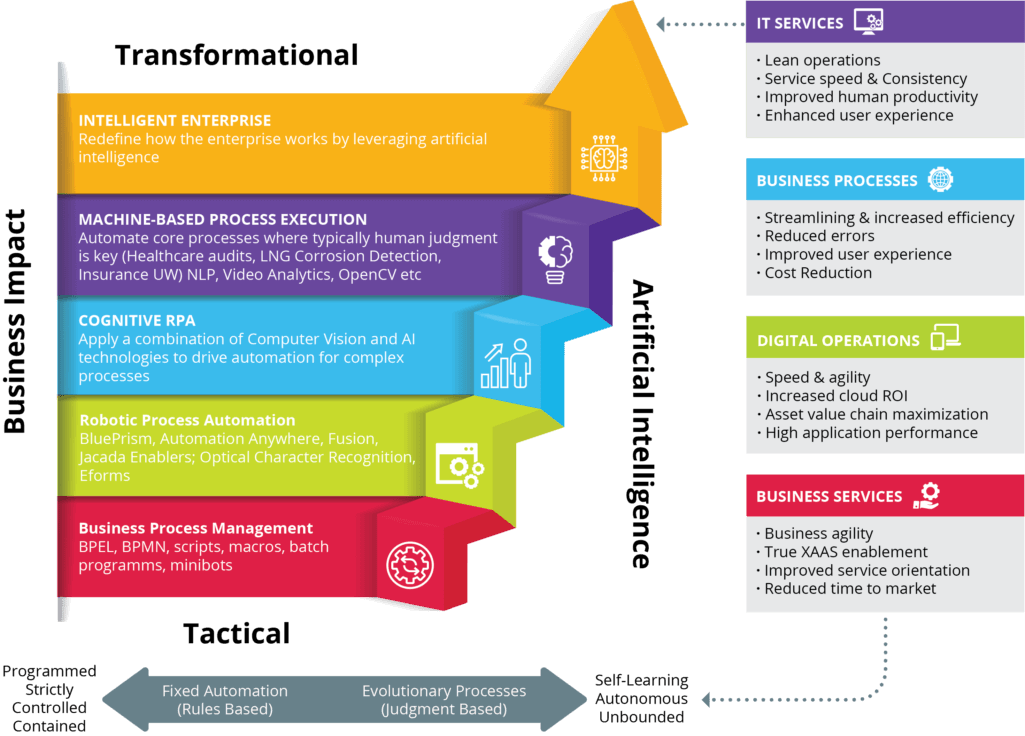AI RPA
Leverage the power of complementary technologies AI and RPA
PS3G can help you improve process efficiency, reduce manual errors, transform business models so that employees can focus on higher value work by leveraging Robotic Process Automation (RPA). PS3G has experience in using tools such as Automation Anywhere, Blue Prism, UI Path, Work Fusion and Open Span. We use our proprietary 180 day process to transform any business and incorporate RPA. The roadmap includes
Engaging and Aligning Expectation
Identifying existing transformation initiatives to minimize disruption
Decide strategy from assessment to deployment
Conduct Technology capability assessment
Define capability delivery models
Create matrix to assessing and prioritizing automation initiatives
Develop and Deploy proof of concept
Develop adoption roadmap
Scale to production based on data gathered

Robotic process automation (RPA) is ideal for performing rule based tasks such as entering purchase invoices, generating bids in an ERP system, establishing a new customer account in multiple systems simultaneously, and the routines related to the hiring of a new employee and the start of employment relationships. The common denominator in all of these adding a sequence of data in predefined data sets. When these tasks are automated it leads to effort savings and also reduces errors.
Artificial Intelligence (AI) on the other hand is a collection of advanced technologies that allows machines to sense, comprehend and learn based on information gathered. It’s different from Robotic Process Automation (RPA) since RPA itself is not considered intelligent and acts based on rules. A use case of Artificial Intelligence (AI) is determining the traffic pattern in real time and according changing the traffic signal without any human intervention. The machine and algorithm need to make smarter decisions as they learn, infer and communicate with things around them.
IBM’s Watson cognitive system is capable of human-like inference and communication and showcases cognitive abilities. Watson has already proved its abilities in a various fields such as quizzes to healthcare projects. It was recently announced that Watson would be helping the crew in the space. Another example of artificial intelligence (AI) is Google’s DeepMind, which learns from its experiences and feedback.
Robotic Process Automation (RPA) and Artificial Intelligence (AI) are different technologies and can be used independent of each other. However, they both complement each other and combination of both is extremely powerful. The question is which technology should organization implement? It depends on the use case. Based on organization need, it is easy and cheaper to implement Robotic Process Automation (RPA). PS3G can use tools such as Automation Anywhere, Blue Prism, UI Path, Work Fusion and Open Span to replicate the human operations in order to run business processes. Because the tools mimic exactly what the human operators were supposed to do (by logging into a system, entering data, clicking ‘OK’ etc.) the underlying ERP, CRM, Office applications work exactly the way they have been working without requiring any changes. During our PoC phase for the client, we provide a ROI on the system which we are going to implement. The cost savings by implementing a RPA are usually recorded within six months. In addition to cost savings, RPA speeds up the process and reduces any human errors.
So should the organizations implement RPA? It again depends on the use case as the RPA robots are dumb. They will perform repetitive tasks what they are coded to do. They preclude any self-learning capabilities. This is addressed by Artificial Intelligence (AI). For example, AI technologies, including Natural Language Processing (NLP) would be able to extract the relevant data from available text even if the text is written in free-from and then using Natural Language Generation (NLG) a new document can be prepared in free-form based on data collected from the extracted text. AI is powerful to understand the emails content and the context which are going out of the organization. With each interaction AI system will learn and provide the confidence index. AI is also capable of making complex decisions based on cognitive reasoning and augment the RPA process. This is especially helpful in case of using chatbots which are capable on answering complex multiple queries posed by humans. This is achieved by mapping all the knowledge and experience that a subject matter expert may have about a process into a model.



